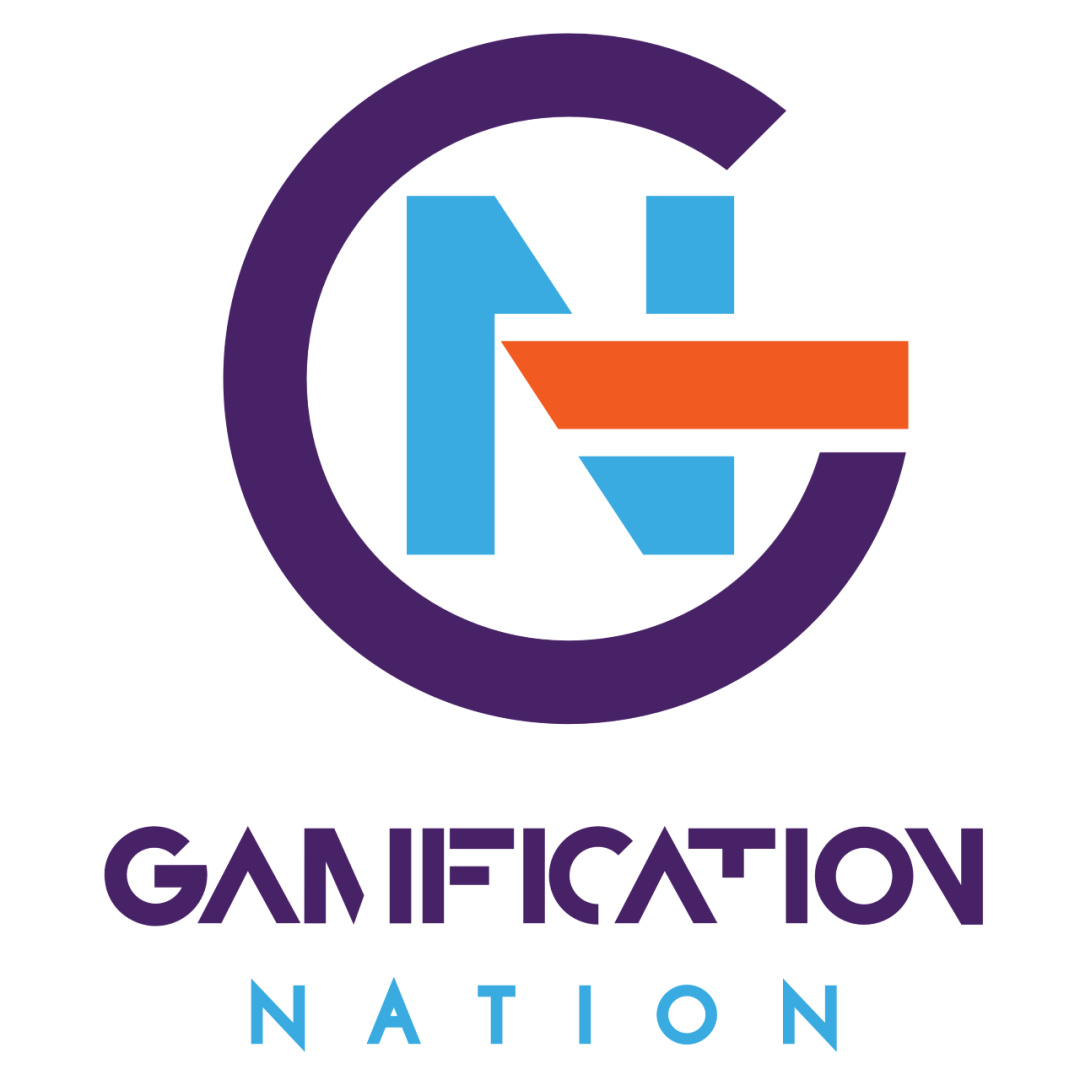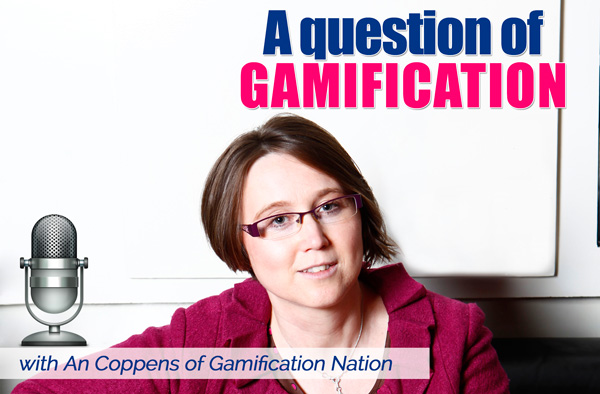How games inspire us in gamification?
We want to pick a game that you all know to illustrate how we work and how it inspires what we do.
I often tell our game designers that you can make any game into something that we can use either for learning, for HR, for recruitment, onboarding, marketing, lead generation, etc. Sometimes they frown their eyebrows at me to sort of say, “Well, that actually doesn’t work.” Or, “We don’t know how that could work.” Then we tease it out a little bit further. My thinking is always if there is some commonality in the game and in the business problem that we’re trying to solve, then we have a chance that it could fit. If it appeals to the people that are in that organisation, then obviously we can look at how can that game applies. Or how can we take the game elements that work for that game and apply it to the processes that they have? Whether that’s marketing, HR, sales, you name it. Whatever is a process in business we can add game elements to it.
Board games are social in nature
Let’s pick on an example that you probably all know, the game of Monopoly. The game of Monopoly is a board game. By default, the game genre or the game type is social in nature. Why? Because people have to sit around a table to play it. It’s not something that you do on your own. I mean, maybe some people can, maybe there are online versions that you can play on your own, typically against a bot which pretends to be another player.
Monopoly is a good example of a social setting game that can be quite complex and where you can have up to five or six people playing at the same time. Where could a board game be useful in the world of work? Well, actually any time where you have a conference, anytime where you have learning taking place in groups or even at leadership events where you want to address a specific, rather complex situation, board games can be very useful.
I would even argue that often board games trigger more conversation than let’s say any digital type of game or digital type learning or even structured classroom learning. Because what you’re basically asking people to do is apply their limited knowledge to solve a problem, AKA the game.
Games ask you to solve problems
What problem does Monopoly solve? Well, it basically gets you to think about the supply and demand of real estate, the supply and demand of your money, and how far it stretches.
It also makes you think about, “Okay. Strategically, which types of streets do I want? What kind of buildings can I afford to put on them? And how lucky am I in rolling the dice?” Because there is an element of luck attached to the Monopoly game as well.
Whatever game genre you pick, it needs to be fitting to your audience, but also fitting to the problem you’re trying to solve.
If you want people to be able to access your game remotely, then obviously it needs to be in some shape or form digital or able to be posted to them.
Imagine how the losers feel and experience the game (as well as the winners)
In Monopoly, each player plays for themselves and plays against the other players and ultimately there is a winner and a whole bunch of losers at the end. Some of the losers will feel the pain as they go through the game. Some of the losers just have been playing all along but just didn’t end up with all of the money in the end of the day.
To compete or to collaborate that is a purpose driven question
The thing to consider is what you wanted the game to do. Do you want it to be competitive? If you have competitive people, we often ask the question is that the best strategy for your game? Because often when you have really competitive spirits, then I would suggest look at a collaborative board game. If you want to make it a social event-related … because you still want people to talk to each other after, you still want people to work together. And for a workplace setting, often collaboration is something that’s desired by many employers that we’ve met and it could be useful.
Is team play important to you or is it individual? There are some considerations to take into account when you pick the game type. Monopoly is what we picked for now. It’s social in nature, it’s every person for themselves. And whoever has the best strategy on claiming maybe the most expensive streets and build hotels on them is the person that wins the game.
Have clear win conditions
How do they win? Well, obviously, here it’s about money. It’s about landing on the right places. So, there’s an element of luck but there’s also an element of critical thinking. Some people buy every item that they land on. Some people only buy the ones that they really are looking out for. Some people like to own the utilities. Some people like to own the stations. Whatever strategy you pick, it’s up to you. It’s up to the player.
Now the winner will realise over a number of rounds that they’re winning because people are paying them big money and bigger and bigger as they build more and own more streets. So, they’ll probably feel mighty chuffed and mighty lucky that they got this headstart and now their winning. Now for the loser who’s trying to penny pinch, still buy, and stay in the game, it’s a whole totally different experience. It’s more about, “Okay, what can I do? How can I escape having to pay out?”
If you’re unfortunate and you have to go to jail or you pick a really unfortunate, a few set back cards, you know your game can be made miserable in a few very quick steps. So, how do you want people to feel when they’re playing is something I often ask our clients. And it’s something to consider about the games you’re playing and looking at for inspiration for potential gamification or a serious game that you’re going to use to solve a problem in your company. I would always say, “How will the winners feel?” And, “How will the losers feel?” And, “Are those feelings desirable for teaching them something that’s important in business or is that something you don’t want them to feel?”
So, for a board game, for example, if you choose collaboration versus competition, if you have a collaborative board game, it’s the team around the table against the board. So, the game needs to be hard enough on the board for the team to all get stuck in and feel like they have a role to play to defeat the board. If you go for one to one or competitive play where all the players sitting alongside each other can win or lose, you’ll cause an element of peer to peer pressure, a bit of banter hopefully.
Because if you think about the people that play Monopoly specifically, for us, it’s usually was a game that came out around holidays or when friends or family were visiting. So, it’s clear that you have that kind of relationship with one another that you’re going to have a bit of a joke and a bit of a laugh. “Oh, well, you go to prison.” Or, “Hey you. She always gets the most expensive hotel on the most expensive street in that particular city.” So, the banter can be something you do want to encourage.
We learn from losing
When there’s losers, also look at your people and say, “Okay. How did they cope with losing?” “Is it a useful skill?” Because if it’s useful to learn and remembering that we actually learn more from our mistakes and we learn from how we win. Because winning might be accidental, we might strike lucky. We might be the first that ended up on the most expensive street and had the funds to buy it and therefore you should have and you did.
Winning teaches the person what it feels like to win, most of the time. Losing, teaches them, “Okay. I played a strategy and the strategy didn’t work.” You often find that people who lose are more reflective and would think, “Okay. What could I have done differently?” If you’re using serious games for learning, for specific context, I would even encourage you that you do a debrief and actually get into that discussion, “What did you learn from the game? Why did you win? Why did you lose? What would you do different?”
Game design is about creating emotional connections
Remember also that game design is about creating an emotional connection and an emotional experience as such. In most cases, when we design a serious game and games for digital purposes or for learning, we often think about: “How will players feel?”, “Is that intentional?”, “How can we make them experience something more or something less,” in some cases. The emotional connection is what sets games apart typically from traditional learning, traditional information processing in companies, even mailshots and information passing from your company to your potential clients.
Decide what are the critical game mechanics
Then the next thing to look at, what are the critical game mechanics that make it so much fun? So, is there such a thing? Is there a critical game mechanics? So, the element of luck, the rolling of the dice in Monopoly is a game mechanic that actually adds to the game because it makes it less predictable who’s going to win and who’s going to do well or not.
The other critical thing is that, obviously, you have a board with set squares on it which each provide a function. The fact that there are so many squares on the board and how they’re distributed, is a question of balancing the game. That’s where the art of game design really comes in. Balancing a game, making it fair for all the players to be able to potentially win and do well is what game designers, like ourselves, actually specialize in.
And it’s not so easy. Most of the people that design games for the first time find that it’s an element of luck to get it right or an element of testing to get it right. It takes multiple tests to take multiple pieces of feedback to understand, “Is this working? Is this fair? Is this fun?” Because those are the kinds of things you do want to put in.
In Monopoly, you have the squares where you go to jail, but you also have free parking which is a resting place where nothing actually happens. You have squares where you’re asked to take a particular card which can drive you forward or set you back depending on the card. And the money in the game is important because that determines how well you will do. So, if you throw more higher numbers, you collect more money at each time starting a new round. You also, if you have started building houses and you have bought land, you start collecting rent.
There are different ways on how the money is super vital in the game of Monopoly. If we were to distill it down, the board and the various pieces are essential, the dice are essential and the money is essential. And how those interact is what creates the dynamics that makes the game of Monopoly work. If you were to distill down what makes a good game and how that could apply to a problem you’re trying to solve is you have to look at the narrative.
Does the narrative work for my problem?
Does a real estate narrative, like you have in a Monopoly, help in your problem. Now if you’re in real estate, probably yes, if you’re into anything else, probably not. So, what should the narrative be for your game? How can they win? So, what are the win conditions? How can the people that sit around a table win? How do you want to make them feel when they’re winning, when they’re losing, when they’re playing? So those are critical components. And then what are the game mechanics that make the game work and that are essential to the game?
The temptation for all of us when we start out in game design is to throw as many game mechanics to a game as possible. And I would argue that’s probably the worst thing you could do because you make it super complex and very hard to balance. So, less is more when you’re starting out. Even a game with only one win condition as a game mechanic can work. So, that’s what we’ve realized over years of testing and experimenting, and obviously, the genre needs to be specific to your problem, work for your audience, et cetera.
Those are the critical components that we look at when we’re looking for inspiration from games that are in existence. And this is how we recommend that you could use it in your organisation. So, look out for more content of this type because we’ll debunk a few more game types and see how they can inspire. Thank you for listening and keep sending us your questions and we will do our best to answer them.




